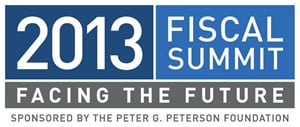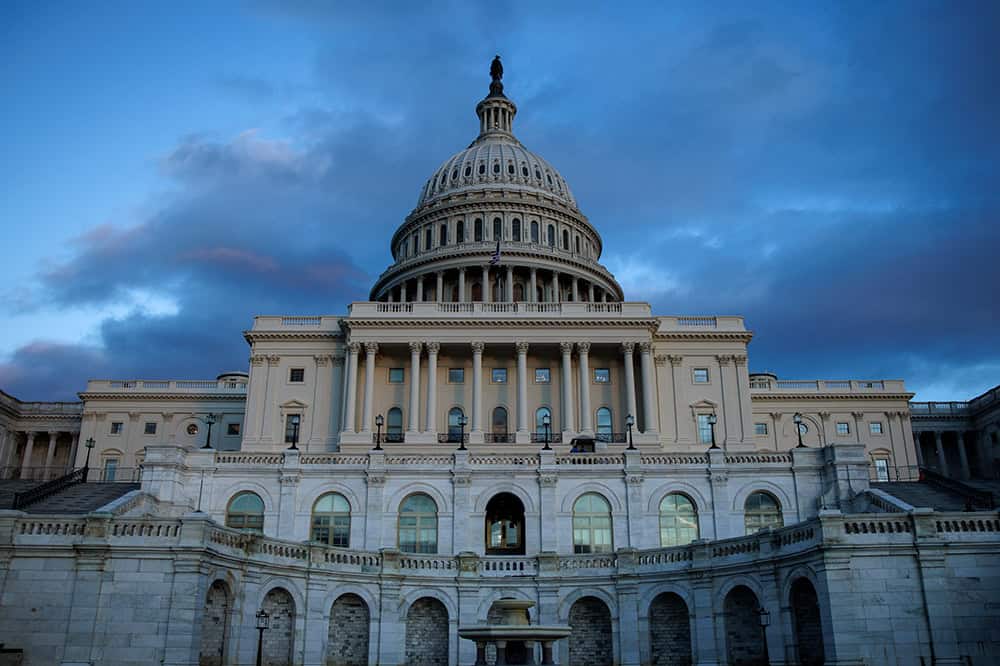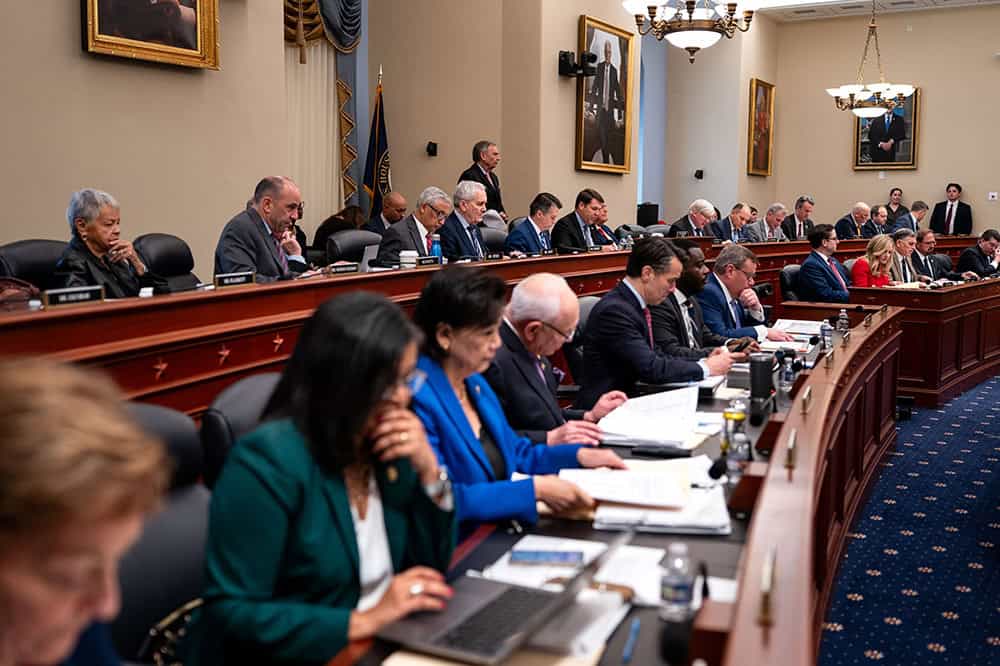President Bill Clinton and Bill Gates Discuss America’s Future and Its Fiscal Challenges
The 2013 Fiscal Summit: "Facing the Future" will convene top lawmakers and experts to discuss how today’s fiscal policy decisions shape America's future
Participants to include House Budget Chairman Paul Ryan, Senate Budget Chairman Patty Murray, Senator Rob Portman, Representative Chris Van Hollen, Gene Sperling, Admiral Mike Mullen, Carly Fiorina, David Brooks, Juan Enriquez and other leading experts
WASHINGTON, DC — As President Obama and Congress confront the nation’s fiscal outlook and other top priorities, the Peter G. Peterson Foundation is convening its fourth annual Fiscal Summit. The 2013 Fiscal Summit: “Facing the Future” features a keynote conversation between President Bill Clinton and Bill Gates, who will examine the most powerful trends facing the country and consider how today’s policy decisions will shape the future of America.
The Summit brings together elected officials from across the political spectrum, budget and policy experts, and business leaders to discuss the implications of today’s fiscal decisions on the future of America’s workforce, healthcare, education, technology, national security and economy.
“The fiscal choices we make today will have a major impact on the opportunities and challenges that face the next generation,” said Foundation Chairman Peter G. Peterson. “To compete in the global economy, America must have the resources to make critically needed investments in education, innovation, and infrastructure. The growing long-term debt burden threatens those priorities. If we bring our long-term debt down to sustainable levels, the America of the future can be a rapidly growing America, a compassionate America, and a secure and competitive America, innovating and leading in the world economy.”
“The rapidly rising cost of health care and the changing demographics of work and retirement represent major and undeniable challenges to America’s future. Addressing these structural changes is essential if America is to maintain its leadership role in the world,” said Foundation President Michael A. Peterson. “Solving these big, long-term issues effectively and fairly will take time, so we need to get at it. After the missed opportunities of last year, elected leaders from both parties need to come together on a comprehensive long-term plan that puts the nation back on a path to fiscal sustainability and economic prosperity.”
Summit Participants include:
- President Bill Clinton
- Bill Gates, Co-Chair of the Bill & Melinda Gates Foundation
- Governor Martin O’Malley, State of Maryland
- Senator Patty Murray, Chairman of the Senate Budget Committee
- Senator Rob Portman, Member of the Senate Budget and Finance Committees
- Representative Paul Ryan, Chairman of the House Budget Committee
- Representative Chris Van Hollen, Ranking Member of the House Budget Committee
- Representative Peter Roskam, Chief Deputy Whip of the House Majority
- Representative Xavier Becerra, Chairman of the House Democratic Caucus
- Gene Sperling, Director of the National Economic Council
- David Brooks, New York Times Columnist
- Susan Dentzer, Senior Policy Advisor, Robert Wood Johnson Foundation
- Juan Enriquez, Co-Founder of Synthetic Genomics Inc. and Managing Director of Excel Venture Management
- Harvey Fineberg, MD, PhD, President of the Institute of Medicine
- Carly Fiorina, Board Chair of Good360
- Mark McClellan, MD, PhD, Director of the Brookings Institution’s Engelberg Center for Health Care Reform
- Admiral Mike Mullen, Former Chairman of the Joint Chiefs of Staff
- Janet Murguía, President and CEO of the National Council of La Raza
- Peter G. Peterson, Founder and Chairman of the Peter G. Peterson Foundation
- Michael A. Peterson, President of the Peter G. Peterson Foundation
Interviewers and Moderators include:
- Peter Cook, Chief Washington Correspondent, Bloomberg Television
- Tamron Hall, National Correspondent, NBC’s Today; Anchor, NewsNation, MSNBC
- Andrea Mitchell, Chief Foreign Affairs Correspondent, NBC News; Host, Andrea Mitchell Reports, MSNBC
- Julie Rovner, Health Policy Correspondent, NPR
- Chuck Todd, Chief White House Correspondent, NBC News
More information about the Summit live-streamed video is available at: www.fiscalsummit.com.
Prior to the Fiscal Summit, the Peterson Foundation published the latest edition of the Fiscal Confidence Index, measuring public sentiment about the national debt. The key findings of the survey included:
- The April 2013 Fiscal Confidence Index value is 44 (100 is neutral), indicating strongly negative public sentiment about America’s fiscal situation.
- 83% of Americans agree that addressing the national debt should be among the President and Congress’s top three priorities.
- 86% are concerned that, without reforms, Social Security and Medicare will put too much of a financial burden on younger generations.
- 53% view President Obama’s budget proposal that includes increased revenue and a reduction in spending as a “very” or “somewhat” significant step towards compromise.
- 77% of Americans believe that building a strong foundation for future economic growth would be an important benefit of reducing our debt.
- 75% of Americans believe that having resources to invest in education would be an important benefit of reducing our debt.
- 70% of Americans believe that improving national security would be an important benefit of reducing our debt.
More information about this polling data is available at: www.pgpf.org/fiscalconfidenceindex.
About the Peter G. Peterson Foundation
The Peter G. Peterson Foundation is a nonprofit, nonpartisan organization established by Pete Peterson — businessman, philanthropist and former U.S. Secretary of Commerce. The Foundation is dedicated to increasing public awareness of the nature and urgency of key long-term fiscal challenges threatening America’s future and to accelerating action on them. To address these challenges successfully, we work to bring Americans together to find and implement sensible, long-term solutions that transcend age, party lines and ideological divides in order to achieve real results. To learn more, please visit www.pgpf.org.
Further Reading
Long-Term Budget Outlook Leaves No Room for Costly Legislation
As lawmakers consider costly legislation to extend expiring tax provisions this year, CBO’s latest projections serve as a warning that our fiscal outlook is already dangerously unsustainable.
Republicans Considering Costly Tax Cut Proposals
Leaders in Congress and the Administration have outlined a broad package of tax cuts that could total $9.1 trillion.
Moody’s Warns Recent Policy Decisions Worsen U.S. Fiscal State, Maintains Negative Outlook Rating
Moody’s says that the United States is in fiscal deterioration, warning that government policy decisions in the near term could contribute to higher interest rates and worsening national debt.



